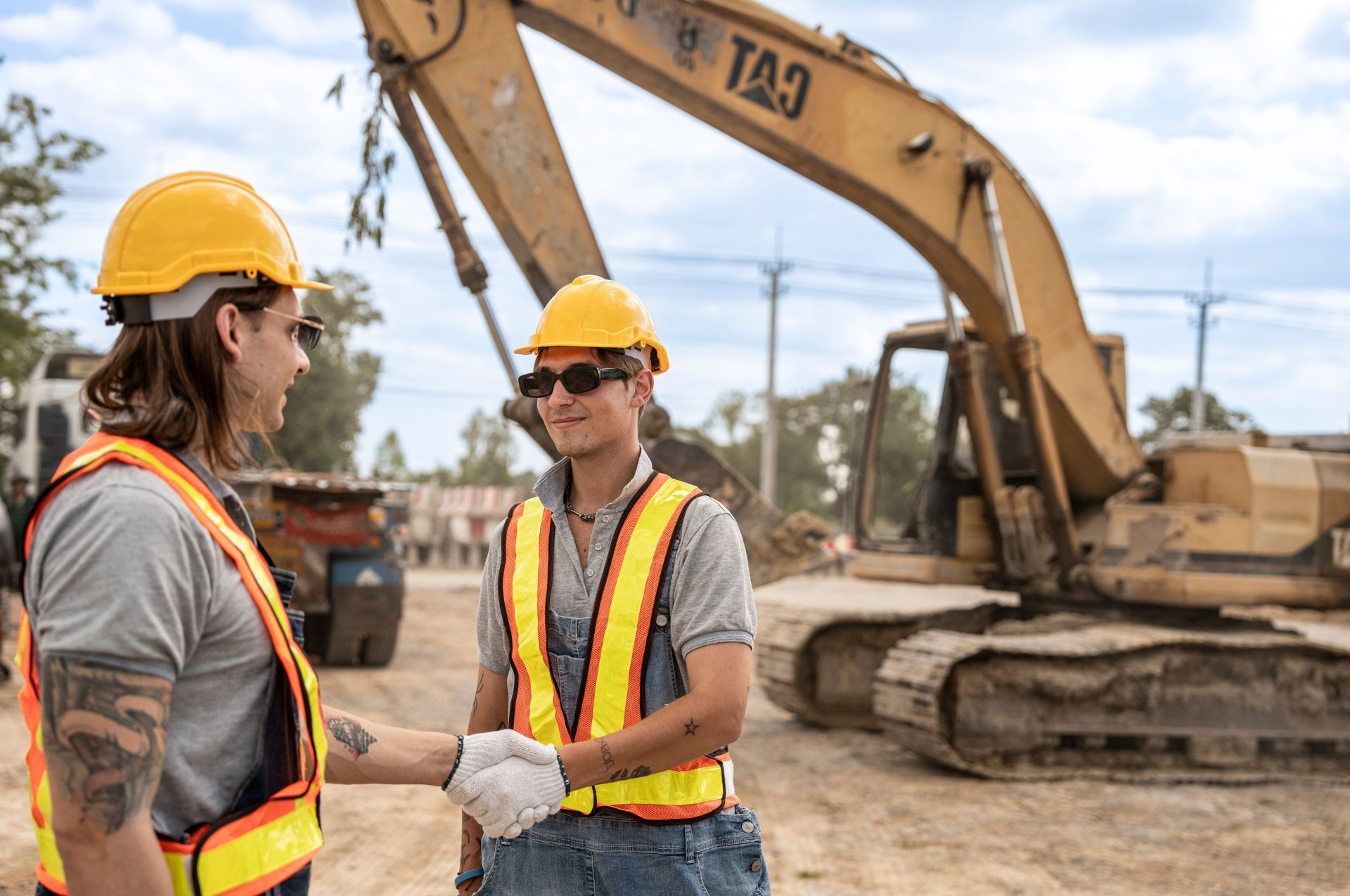
Top 3 Recommended Policies
Excavation contractors play a crucial role in the construction industry, laying the groundwork for various projects, from residential homes to large commercial buildings. However, the nature of excavation work comes with its own set of risks and challenges. This is where excavation contractors insurance becomes essential. This guide aims to provide a comprehensive overview of excavation contractors insurance in Connecticut, covering its importance, types of coverage, and how to choose the right policy.
Understanding Excavation Contractors Insurance
Excavation contractors insurance is specifically designed to protect professionals in the excavation industry from potential liabilities and risks associated with their work. Given the physical nature of excavation, contractors face various hazards, including accidents, equipment damage, and environmental issues. Insurance helps mitigate these risks, ensuring that contractors can focus on their work without the constant worry of financial repercussions from unforeseen incidents. This specialized insurance not only covers direct costs associated with accidents but also provides support for legal fees and settlements that may arise from lawsuits, making it an indispensable tool for any excavation contractor.
Why Insurance is Essential for Excavation Contractors
In Connecticut, as in many other states, excavation contractors are required to carry certain types of insurance. This requirement is not just a legal obligation but a crucial aspect of running a responsible business. Without adequate insurance, contractors risk facing significant financial losses due to lawsuits, property damage, or workplace injuries. Additionally, the construction industry is highly competitive, and having the right insurance can be a deciding factor for clients who are evaluating potential contractors for their projects.
Moreover, having insurance can enhance a contractor's credibility. Clients often prefer to work with insured contractors, as it provides them with peace of mind knowing that they are protected against potential mishaps. This can lead to more business opportunities and a stronger reputation in the industry. Furthermore, many larger projects require proof of insurance before a contractor can even submit a bid, making it essential for contractors who wish to expand their portfolio and take on more significant, lucrative projects.
Key Risks Faced by Excavation Contractors
The excavation industry is fraught with various risks that can lead to costly claims. Some of the most common risks include:
- Workplace Injuries: Excavation work often involves heavy machinery and hazardous environments, increasing the likelihood of accidents. Proper training and safety protocols are critical, but even with precautions, the nature of the work can lead to unexpected injuries.
- Property Damage: Excavation can inadvertently cause damage to nearby properties, leading to expensive claims. This could include anything from damaging underground utilities to affecting the structural integrity of adjacent buildings.
Environmental Hazards: Issues such as soil erosion, contamination, or damage to local ecosystems can result in legal liabilities. Excavation contractors must be vigilant about environmental regulations and best practices to avoid costly fines and remediation efforts.
In addition to these risks, excavation contractors must also navigate the complexities of compliance with local, state, and federal regulations. This includes obtaining the necessary permits and ensuring that all work adheres to safety standards. Failure to comply can not only result in fines but can also lead to project delays and damage to a contractor's reputation. Therefore, having comprehensive insurance coverage is not just about protection; it is also about ensuring that contractors can operate smoothly and efficiently within the legal framework of their industry.

Types of Coverage for Excavation Contractors
Excavation contractors insurance is not a one-size-fits-all solution. Various types of coverage are available, each designed to address specific risks associated with excavation work. Understanding these different types of coverage is essential for contractors to ensure they have the right protection in place.
General Liability Insurance
General liability insurance is one of the most critical types of coverage for excavation contractors. This insurance protects against third-party claims for bodily injury, property damage, and personal injury. For example, if a passerby is injured on a job site or if equipment causes damage to a neighboring property, general liability insurance can cover the associated costs.
In Connecticut, having general liability insurance is often a requirement for contractors to obtain necessary licenses and permits. It serves as a fundamental layer of protection against common risks faced in the industry. Additionally, general liability insurance can also cover legal fees if a contractor faces a lawsuit, providing peace of mind that the financial burden of legal defense will not fall solely on the contractor's shoulders. This type of coverage is particularly important in a field where the potential for accidents and claims is heightened due to the nature of the work.
Workers' Compensation Insurance
workers' compensation insurance is essential for any business that employs workers, and excavation contractors are no exception. This insurance provides coverage for medical expenses and lost wages for employees who are injured on the job. In Connecticut, employers are legally required to carry workers' compensation insurance, ensuring that employees are protected in case of workplace accidents.
Excavation work can be particularly hazardous, making workers' compensation insurance a critical component of any contractor's insurance portfolio. It not only protects employees but also helps contractors avoid potential lawsuits related to workplace injuries. Furthermore, having this insurance can enhance a contractor's reputation as a responsible employer, which can be beneficial in attracting skilled labor and securing contracts. By prioritizing worker safety and providing adequate insurance coverage, contractors can foster a more productive and motivated workforce.
Equipment and Tools Insurance
Excavation contractors rely heavily on specialized equipment and tools to perform their work. Equipment and tools insurance covers the loss, theft, or damage of these essential items. Given the high cost of excavation machinery, this type of insurance can save contractors from significant financial setbacks.
In addition to covering physical damage, some policies may also include coverage for equipment breakdowns, ensuring that contractors can quickly resume operations without incurring substantial repair costs. Moreover, this insurance can extend to rental equipment, which is often used in the excavation industry, providing a comprehensive safety net for contractors who may not own all the necessary machinery outright. By protecting their tools and equipment, contractors can maintain operational efficiency and minimize downtime, which is crucial in a competitive market where project timelines are often tight.
In addition to the primary types of insurance, excavation contractors may also consider additional coverage options to enhance their protection. These options can be tailored to fit the unique needs of a contractor's business, ensuring comprehensive risk management in a field fraught with potential hazards and liabilities.
Professional Liability Insurance
Professional liability insurance, also known as errors and omissions insurance, protects contractors against claims of negligence or inadequate work. This coverage is particularly important for contractors who provide consulting or design services in addition to excavation work. If a client alleges that a contractor's work led to financial losses or project delays, professional liability insurance can help cover legal costs and settlements. Furthermore, this type of insurance can also extend to cover situations where a contractor's advice or recommendations are called into question, providing an additional layer of security in a highly competitive industry.
Commercial Auto Insurance
Excavation contractors often use vehicles to transport equipment and personnel to job sites. Commercial auto insurance provides coverage for vehicles used for business purposes, protecting against accidents, theft, and damage. This type of insurance is crucial for contractors who rely on vehicles to operate their businesses effectively. In Connecticut, having commercial auto insurance is not just a good idea; it is a legal requirement for any vehicle used for business operations. This ensures that contractors are protected while on the road.
Moreover, commercial auto insurance can also cover various types of vehicles, from trucks and vans to specialized equipment transporters, ensuring that all aspects of a contractor's fleet are adequately protected. In addition to liability coverage, many policies offer options for comprehensive and collision coverage, which can be invaluable in the event of an accident or damage caused by unforeseen circumstances, such as natural disasters. Additionally, some insurers may offer coverage for rental vehicles, which can be beneficial when a contractor needs to temporarily replace a damaged vehicle, allowing for minimal disruption to ongoing projects.
How to Choose the Right Insurance Policy
Choosing the right insurance policy can be a daunting task for excavation contractors. With various options available, it's essential to take a strategic approach to ensure adequate coverage. Here are some key considerations to keep in mind when selecting an insurance policy.
Assessing Business Needs
Every excavation contractor's business is unique, and insurance needs can vary significantly. Conducting a thorough assessment of the specific risks associated with the business is crucial. This assessment should include factors such as the size of the business, the types of projects undertaken, and the number of employees.
By understanding the unique risks, contractors can identify the types of coverage that are most relevant and necessary for their operations. This tailored approach ensures that they are not overpaying for unnecessary coverage while still being adequately protected. Additionally, contractors should consider the geographical areas in which they operate, as different regions may have varying regulations and risks, such as soil conditions or weather-related challenges that could impact excavation work.
Comparing Quotes from Multiple Insurers
Once the specific coverage needs have been identified, it is advisable to obtain quotes from multiple insurance providers. This process allows contractors to compare premiums, coverage limits, and policy terms. It is essential to look beyond just the price; understanding the level of customer service and claims support offered by each insurer is equally important.
Many insurance companies specialize in construction and excavation insurance, so seeking out those with experience in the industry can provide additional peace of mind. Contractors should take the time to read reviews and ask for recommendations from peers in the industry. Networking with other contractors can also yield valuable insights into which insurers have proven reliable in times of need, as well as any pitfalls to avoid when selecting a policy.
Understanding Policy Terms and Conditions
Insurance policies can be complex, with various terms and conditions that may not be immediately clear. Contractors should take the time to read and understand the policy documents before making a decision. Key aspects to pay attention to include coverage limits, deductibles, exclusions, and any additional endorsements that may be necessary.
Engaging with an insurance agent or broker who specializes in construction insurance can be beneficial. They can help clarify any confusing terms and ensure that contractors fully understand what their policy covers and any potential gaps in coverage. Furthermore, it’s wise to periodically review the policy as the business grows or changes. As new equipment is acquired or new types of projects are undertaken, the insurance needs may evolve, necessitating adjustments to the coverage to maintain adequate protection against emerging risks.

The Cost of Excavation Contractors Insurance
The cost of excavation contractors insurance can vary widely based on several factors, including the size of the business, the types of coverage selected, and the contractor's claims history. Understanding these factors can help contractors budget for insurance expenses effectively.
Factors Affecting Insurance Premiums
Several key factors influence the premiums that excavation contractors will pay for insurance:
- Business Size: Larger businesses with more employees and higher revenue may face higher premiums due to increased risk exposure.
- Type of Work: Contractors who engage in riskier projects may pay more for insurance. For example, excavation work in urban areas with tight spaces may present more hazards than rural projects.
- Claims History: A contractor with a history of frequent claims may face higher premiums, as insurers view them as higher risk.
Budgeting for Insurance Costs
When budgeting for insurance costs, contractors should consider not only the premium payments but also potential deductibles and out-of-pocket expenses in the event of a claim. It's essential to strike a balance between adequate coverage and affordability.
Contractors should also keep in mind that investing in comprehensive insurance can save money in the long run by protecting against significant financial losses. Regularly reviewing and adjusting insurance coverage as the business evolves is a wise practice to ensure ongoing protection.
Additionally, contractors should explore bundling options, where multiple types of insurance are purchased together, potentially leading to discounts. For instance, combining general liability insurance with workers' compensation can often result in lower overall premiums. Engaging with an experienced insurance broker who understands the nuances of excavation work can also provide valuable insights into the best coverage options available, tailored to the specific needs of the business.
Moreover, staying informed about industry trends and safety regulations can further influence insurance costs. By implementing robust safety protocols and training for employees, contractors can reduce the likelihood of accidents, which in turn may lead to lower insurance premiums. Insurers often reward businesses that demonstrate a commitment to safety with reduced rates, making it a win-win situation for both the contractor and the insurance provider.
Common Myths About Excavation Contractors Insurance
Despite the importance of excavation contractors insurance, several myths and misconceptions can lead to misunderstandings about its necessity and benefits. Addressing these myths can help contractors make informed decisions about their insurance needs.
Myth 1: Insurance is Only Necessary for Large Contractors
One common misconception is that only large contractors need insurance. In reality, all contractors, regardless of size, face risks that can result in significant financial losses. Small contractors are just as vulnerable to lawsuits and accidents, making insurance essential for businesses of all sizes.
Myth 2: Insurance is Too Expensive
While insurance costs can vary, many contractors assume that they cannot afford adequate coverage. However, the potential costs associated with not having insurance can far exceed the premiums paid. Additionally, there are often options available for contractors to find affordable coverage that meets their needs.
Myth 3: All Policies are the Same
Another misconception is that all insurance policies provide the same level of coverage. In reality, policies can vary significantly in terms of coverage limits, exclusions, and endorsements. It is crucial for contractors to carefully review and compare policies to ensure they are getting the protection they need.
Conclusion
Excavation contractors insurance is a vital component of running a successful excavation business in Connecticut. Understanding the various types of coverage available, assessing individual business needs, and choosing the right policy can provide contractors with the protection they need to operate confidently.
By investing in comprehensive insurance, excavation contractors can safeguard their businesses against potential risks, enhance their credibility, and focus on delivering quality work without the constant worry of financial repercussions. As the excavation industry continues to evolve, staying informed about insurance options and requirements is essential for long-term success.
Contact Us
Phone
Locations
Connecticut Location
703 Hebron Ave., 3rd Floor, Glastonbury, CT 06033
North Carolina Location
436 East 36th St., Charlotte, NC 28205


